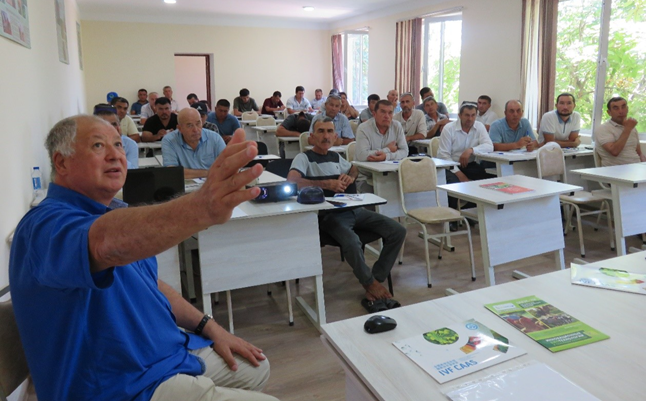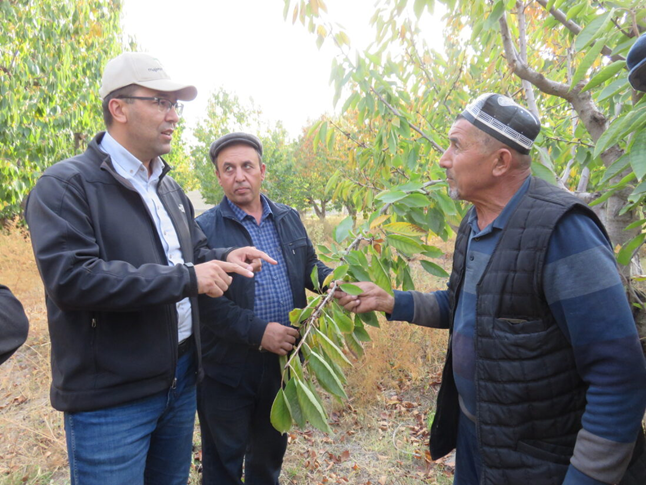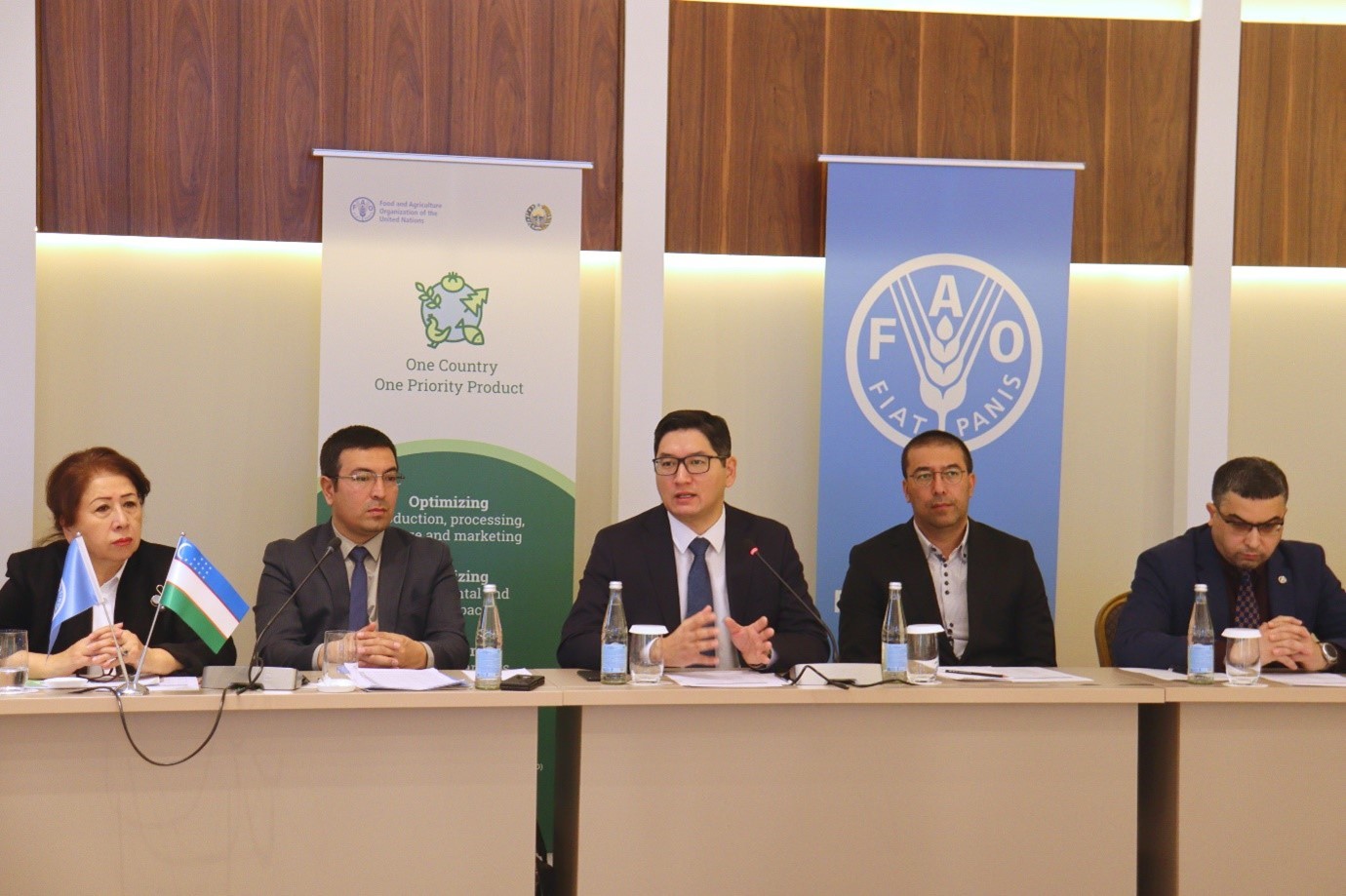News
Uzbekistan set priorities for a sustainable sweet cherry sector under the OCOP initiative

Participants at the OCOP Annual Meeting 2023.
©FAO/Guzal Fayzieva
Tashkent, 14 December 2023 – Over 100 representatives from government, academia, development organizations, farmers, traders, and exporters gathered in Tashkent on 14 December to discuss progress and priorities for the sweet cherry sector in Uzbekistan. The National Annual Meeting on the implementation of the One Country One Priority Product (OCOP) Initiative in Uzbekistan was organized by the Food and Agriculture Organization of the United Nations (FAO) and the Ministry of Agriculture, Uzbekistan.
The meeting focused on assessing progress made in Uzbekistan's sweet cherry sector, with discussions centering around challenges, opportunities, and the formulation of an action plan for 2024–25 under the OCOP initiative. Participants exchanged innovative approaches for plant production, and success stories from farmers benefiting from the OCOP project were shared, injecting renewed hope into the sweet cherry sector.
Under the OCOP global project “Innovative approaches for better plant production” funded through the FAO Flexible Voluntary Contribution (FVC), a team of OCOP experts conducted an extensive value chain analysis of the sweet cherry through consultation with farmers, brokers, and exporters in the cherry-growing districts of the Fergana region to identify the challenges and opportunities in the sector. The report will lay the foundation for a national strategy and action plan to develop the sweet cherry sector, envisioning Uzbekistan as a global powerhouse in sweet cherry production and export.

Training on sweet cherry production in Quva district. ©FAO/Mansur Yuldoshev
Additionally, the team analyzed the current situation and organized a series of on-site training workshops with the participation of more than 400 sweet cherry producers and value chain actors from more than 15 districts in the Fergana and Samarkand regions. The capacity of farmers has been developed based on innovation approaches for better production of sweet cherries, including tree training and pruning, precision irrigation and fertilization, integrated pest management, biopesticides and precision spraying of pesticides, new sweet cherry varieties and rootstocks, establishing modern sweet cherry orchards, and creating a value chain.

Farmers are attending field training in Fergana district. ©FAO/Mansur Yuldoshev
Participants in the meeting stressed the importance of continuous capacity-building, particularly for farmers, to promote green production and efficiency in the sector. “It is important that farmers select high-quality seedlings and understand the climatic conditions of their region. As we have a shortage of agriculture specialists, more capacity-building initiatives, such as online and offline schools for agronomists, will be useful,” said Siddikjon Botaboev, a farmer who received training under the OCOP initiative.
Renewed hope for the sweet cherry sector
Uzbekistan stands out globally as one of the leading sweet cherry producers, boasting an estimated current production of up to 180 thousand tons. The country's agro-ecological conditions favor smallholders, enabling sweet cherry cultivation with minimal use of chemicals.
FAO launched the OCOP initiative in September 2021 that promotes inclusive, profitable, and environmentally sustainable food systems through the sustainable development of special agricultural products by optimizing production, processing, storage, and marketing of products, minimizing environmental and social impacts, and maximizing benefits for farmers and value chain actors.
The Government of Uzbekistan selected sweet cherries as the special agriculture product to be promoted under the FAO OCOP initiative. Eighty-three countries from five FAO regions were designated as potential project countries, with the goal of promoting 53 products. Uzbekistan was selected as one of the first five demonstration countries representing Europe and the Central Asia region, along with Bangladesh, Egypt, Trinidad and Tobago, and Malawi.
The Ministry of Agriculture of Uzbekistan played a leading role in the implementation of OCOP in Uzbekistan, identifying further steps to promote green technologies to support the sustainable development of the cherry value chain. In May 2023, FAO regional launch event and workshop for implementation of the OCOP in Europe and Central Asia was held in Tashkent, Uzbekistan. Additionally, the country established a National Task Force composed of representatives from the Ministry of Agriculture, FAO, research institutes, universities, the private sector, and farmers’ associations.
Recently, as the largest single contribution to the OCOP initiative, China has provided $5 million to support this new global OCOP project under the FAO-China South-South Cooperation Programme, supporting capacity development and demonstration activities in 15 OCOP countries including Uzbekistan.

From left to right: Adiba Akhmedjanova, the Chairman of the Association "Women of the Agricultural Sector" of Uzbekistan; Jamshid Abduzukhurov, Deputy Director of the Department of the Ministry of Agriculture of Uzbekistan; Sherzod Umarov, Assistant FAO Representative in Uzbekistan, Shuhrat Abrorov, National Consultant on Sweet Cherry Value Chain; Khurshid Norov, Monitoring and Evaluation Specialist ©FAO/Guzal Fayzieva
Mr Jamshid Abduzukhurov, Deputy Director of the Department of the Ministry of Agriculture of Uzbekistan, highlighted the importance of the OCOP initiative and stressed the huge potential of the sweet cherry sector. “Uzbekistan has chosen the sweet cherry as a national fruit for promoting sustainable value chains. This choice is based on the fact that today Uzbekistan ranks 4th in the world in cherry production, and cherry exports reached 42 thousand tons, which is 10 thousand tons more than last year, which means there is a great potential for further promotion of this product,” he said.
Mr Sherzod Umarov, Assistant FAO Representative in Uzbekistan, highlighted the government’s sincere commitment to the successful implementation of the initiative in the country. “To enhance the impact of the OCOP implementation in Uzbekistan, we need collective efforts to improve quality, logistics capabilities, and standardization of the product,” he said.
Uzbekistan's active participation in OCOP reflects its commitment to promoting sweet cherries as its special agricultural product. It is expected that Uzbekistan, as an OCOP demonstrating country from Europe and Central Asia, will serve as a model for the other countries in the region that are looking to advance their SAP’s value chains and foster sustainable agricultural development.
- Uzbekistan promotes sweet cherries at OCOP project inception workshop
- Lessons learned: sweet cherries in Uzbekistan and the FAO Special Agricultural Products programme
- Launch event and workshop kicks off OCOP country projects in Europe and Central Asia
- Uzbekistan organizes OCOP training sessions on sustainable sweet cherry production in the five districts of the Fergana Region
- FAO Director-General showcases OCOP Initiative as powerful catalyst for change
- https://www.fao.org/newsroom/detail/fao-ocop-initiative-council/enF
- FAO launches OCOP global project under FAO-China South-South Cooperation
